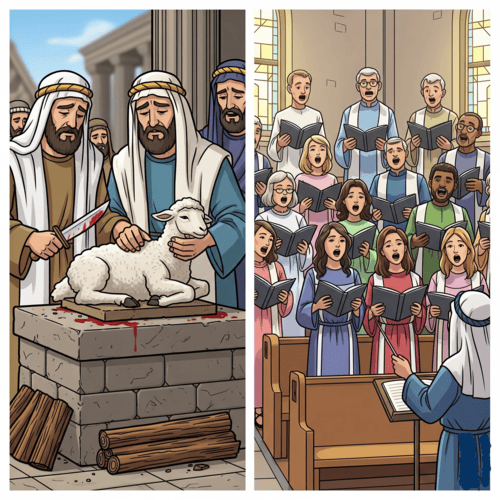‘Sacrifice of Praise’: What Does Hebrews 13:15 Really Mean?
THE REFORMED COVENANT PERSPECTIVE
Picture the Jerusalem temple in its final days—smoke rising from countless animal sacrifices, priests busy with ritual duties, the old covenant system operating as it had for centuries. Now fast-forward to Hebrews 13:15: “Through Jesus, therefore, let us continually offer to God a sacrifice of praise—the fruit of lips that openly profess his name.” What revolutionary shift is the apostle describing? The Reformed tradition offers profound insight into this transformation that goes far deeper than replacing one ritual with another.
FROM BLOOD TO BREATH: UNDERSTANDING THE CONTEXT
The author of Hebrews writes to believers who understood sacrifice intimately. They knew approaching God required blood, death, and priestly mediation. But now everything has changed. The phrase “through Jesus, therefore” signals a massive theological pivot. Because Christ has offered the final, perfect sacrifice for sin, believers no longer bring bulls and goats to an earthly altar. Instead, we offer something entirely different: the sacrifice of praise.
This isn’t merely substituting words for animals. The Reformed understanding recognises this as a fundamental shift from the old covenant to the new, from external rituals to heart worship, from temporary covering to permanent redemption. The sacrifice of praise flows from our union with Christ in the covenant of grace.
THE COVENANT FOUNDATION OF PRAISE
Reformed theology insists true praise emerges from covenant relationship, not human effort. The Westminster Confession teaches all acceptable worship must be grounded in Scripture and offered through Christ’s mediation. This shapes how we understand the sacrifice of praise in three crucial ways.
First, sola gratia governs our praise. We don’t offer praise to earn God’s favour—we praise because we’ve already received His unmerited grace through Christ. Our worship responds to salvation; it doesn’t produce it. This guards against both the pride that thinks our praise impresses God and the despair that fears our praise falls short.
Second, through Christ alone means every word of praise must be mediated by our great High Priest. Just as Old Testament sacrifices required priestly involvement, our praise requires Christ’s perfect righteousness to make it acceptable. Without this mediation, even our best efforts at worship remain tainted by sin.
Third, covenant obligation means praise isn’t optional for believers. The word “continually” in Hebrews 13:15 reflects covenant faithfulness. We’re bound by love and gratitude to offer ongoing praise, not as burden but as joyful response to God’s covenant promises.
WHAT TRUE SACRIFICE OF PRAISE INCLUDES
The “fruit of lips that openly profess his name” encompasses far more than singing hymns. Reformed theology identifies four key elements of this spiritual sacrifice.
- Verbal confession stands first. We openly declare Christ’s lordship, acknowledging His saving work and sovereign rule. This public testimony becomes a sacrifice as we risk reputation, comfort, and social acceptance for the sake of His name.
- Congregational worship expresses covenant community. When believers gather to praise God corporately, we participate in heaven’s worship and demonstrate the unity Christ purchased with His blood. Our songs, prayers, and responses become collective offerings through our covenant Head.
- Grateful living transforms ordinary activities into worship. Paul commands us to “do everything in the name of the Lord Jesus, giving thanks to God the Father through him” (Colossians 3:17). This makes every covenant-honoring action a form of praise sacrifice.
- Generous sharing completes the picture. Hebrews 13:16 immediately adds: “And do not forget to do good and to share with others, for with such sacrifices God is pleased.” Our practical love for others becomes tangible praise, demonstrating that genuine worship affects how we treat our neighbours.
WHAT IT EXCLUDES: REFORMED DISTINCTIVES
Reformed theology carefully distinguishes the sacrifice of praise from several counterfeits. It’s not emotional manipulation designed to generate religious feelings. It’s not ritualistic repetition that substitutes form for heart engagement. It’s certainly not meritorious work that earns salvation or maintains God’s favour.
Most importantly, it’s not independent of Scripture and sound doctrine. True praise flows from understanding who God is and what He has done, as revealed in His Word. Emotional experiences divorced from biblical truth may feel worshipful but lack the covenant foundation that makes praise acceptable to God.
LIVING THE SACRIFICE DAILY
This understanding transforms how Reformed believers approach worship. In corporate gathering, we participate actively, knowing our voices join the covenant community’s ongoing praise. In private devotion, we maintain daily disciplines of prayer and thanksgiving as covenant obligations. In evangelistic witness, our confession of Christ’s name becomes sacrificial praise that may cost us worldly advantage.
Even in suffering, covenant confidence enables continued praise. We worship not because circumstances warrant it, but because God’s covenant promises never fail.
THE HEART OF COVENANT WORSHIP
The Reformed perspective reveals the sacrifice of praise costs us nothing because Christ paid everything—yet demands our whole heart. Through union with Christ, our imperfect praise becomes acceptable worship. This isn’t religious duty but covenant delight, the natural overflow of hearts transformed by grace.
When we truly grasp this covenant foundation, praise becomes both privilege and practice, both gift and obligation, both spontaneous response and disciplined devotion. This is what Hebrews 13:15 really means: covenant people offering continuous praise through our covenant Head to our covenant God.
SACRIFICE OF PRAISE: RELATED FAQs
Does the sacrifice of praise replace the Old Testament priesthood entirely? John Calvin taught the sacrifice of praise doesn’t eliminate priesthood but transforms it—all believers now function as priests offering spiritual sacrifices. He emphasised Christ’s priestly work enables every Christian to approach God directly, making the sacrifice of praise both a privilege and responsibility of the “priesthood of all believers.” This democratises worship while maintaining the necessity of Christ’s ongoing high priestly mediation.
- How do we handle the apparent tension between “continual” praise and human limitations like sleep, work, or depression? Reformed scholars like Herman Bavinck distinguished between the disposition to praise and acts of praise. The heart orientation toward gratitude and worship should be constant, even when circumstances prevent verbal expression. John Owen argued the sacrifice of praise includes the believer’s fundamental posture of covenant faithfulness, which persists even through seasons of spiritual dryness or mental anguish. This prevents legalistic anxiety while maintaining the call to consistent worship.
- Does instrumental music count as sacrifice of praise, given that Hebrews 13:15 specifically mentions “fruit of lips”? Most Reformed theologians, following Calvin’s regulative principle, focus on the “fruit of lips” as verbal confession and singing with understanding. However, scholars like Charles Hodge argued instruments can aid the sacrifice of praise when they support and enhance congregational singing rather than replace it. Worship elements must serve the Word and promote genuine heart engagement, not merely aesthetic experience.
Why do some translations say “sacrifice of praise” while others say “sacrifice of thanksgiving”? The Greek word ainesis can mean both praise and thanksgiving, and Reformed scholars see this as complementary rather than contradictory. John Murray noted biblical praise inherently includes gratitude for God’s works, while thanksgiving naturally expresses praise for God’s character. Both flow from covenant recognition of God’s grace, making the translation debate less significant than understanding the unified concept of grateful, worshipful response to divine mercy.
- What did Westminster-era divines teach about whether the sacrifice of praise has any atoning or sanctifying power? Westminster theologians emphatically denied any atoning power in human praise—only Christ’s blood atones for sin. However, they taught that offering sincere praise does serve sanctification by conforming believers more closely to their covenant identity. Thomas Watson explained that while praise doesn’t earn God’s favour, it does strengthen faith and increase our capacity for joy in God. This maintains the crucial distinction between justification (by faith alone) and progressive sanctification.
- Do liturgical prayers and creeds qualify as “sacrifice of praise” or must these be spontaneous? Reformed theologians generally embrace both liturgical and spontaneous elements as valid expressions of the sacrifice of praise. BB Warfield argued carefully crafted prayers and historic creeds can actually enhance worship by ensuring doctrinal accuracy and connecting believers across time. However, John Frame emphasises that whether liturgical or spontaneous, the sacrifice of praise must engage both mind and heart—mere recitation without understanding fails to meet the biblical standard.
Did believers in Old Testament times offer this sacrifice of praise, or is it exclusively New Covenant? Reformed covenant theology, particularly as developed by Geerhardus Vos, teaches that Old Testament believers did offer spiritual sacrifices alongside ceremonial ones, but with less clarity about Christ’s mediation. The Psalms demonstrate that praise and thanksgiving were always essential worship elements, not mere accompaniments to animal sacrifice. However, Hebrews 13:15 represents the full flowering of what was always true—that God ultimately desires heart worship, now made fully accessible through Christ’s completed work.
SACRIFICE OF PRAISE: OUR RELATED POSTS
Editor's Pick

The Throne-Room Vision: Who Did Isaiah See?
The scene is unforgettable: Isaiah stands in the temple, and suddenly the veil between heaven and earth tears open. He [...]

The Angel of the Lord: Can We Be Certain It Was Christ All Along?
Throughout the Old Testament, a mysterious figure appears: the Angel of the LORD. He speaks as God, bears God’s name, [...]
SUPPORT US:
Feel the Holy Spirit's gentle nudge to partner with us?
Donate Online:
Account Name: TRUTHS TO DIE FOR FOUNDATION
Account Number: 10243565459
Bank IFSC: IDFB0043391
Bank Name: IDFC FIRST BANK






